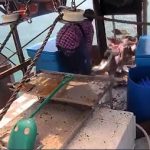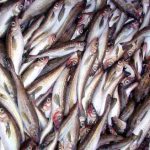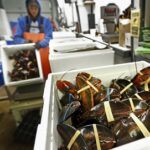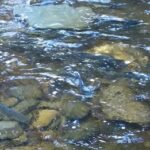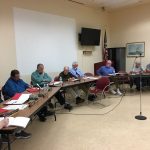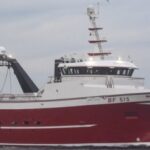Tag Archives: seafood processors
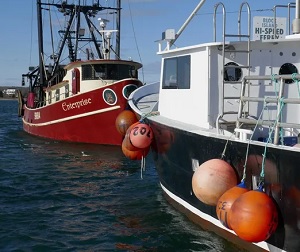
Offshore wind farms bring many uncertainties to RI fishing industry, consumers
I refer to those who fish, commercially, recreationally and for-hire fishermen (charter), as well as those who depend on them to catch fish, such as Rhode Island’s seafood processors, and ultimately consumers. Those who depend on Rhode Island’s millions of dollars of seafood face uncertain futures. This uncertainty is palpable in these communities and there is a feeling that mitigation taking place between wind developers and those who fish lacks consideration of any equity to those being adversely impacted. To many who fish these areas, developing wind farms and their array of cable is little different than strip mining mountains for coal in other parts of the country. By Chris Lee, >click to read< 08:06
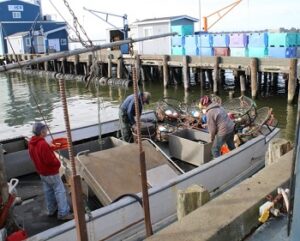
Del Norte Fishermen Experiencing A Disappointing Start To Dungeness Crab Season
Though his was one of the first boats to pull up at Citizens Dock after fishermen pulled their pots on Saturday, Kurt Ivison didn’t have much,,, Kept from plying their trade initially due to poor quality crab and later because of a price dispute with seafood processors, Del Norte County fishermen, and others on the North Coast, set their pots at 8 a.m. Thursday. According to LCZ Unloaders employee Kevin Wilson, fishermen had a “gentleman’s agreement” to start bringing in their catch at 8 a.m. Saturday. Wilson and his coworker Justin Green noted that everything was going at a slower pace, rough weather earlier in the week might have contributed to the lack of crab coming in. >click to read< 08:44
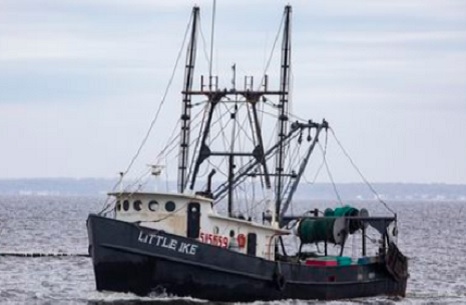
It’s Important! N.J. cleared to provide $11M in relief for sinking fishing industry
Months after the pandemic rocked New Jersey’s fishing industry, millions of dollars in federal coronavirus relief is set to finally flow to the anglers that need it. The National Oceanic and Atmospheric Administration has approved New Jersey’s plan to spend $11.3 million in federal fisheries relief, U.S. Rep. Frank Pallone, D-6th Dist., announced Tuesday. The approval allows state authorities to begin distributing the money, which was allocated to the state as part of the $2 trillion CARES Act that became law in March. >click to read< 09:25
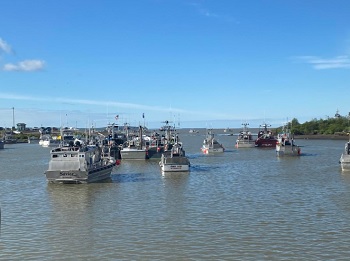
For Alaska’s seafood processors, the Coronavirus pandemic has cost tens of millions
Heading into the 2020 fishing season, many people were concerned that seafood workers from out of state would bring COVID-19 to rural communities. Processing companies managed to keep the disease under control. but at a big cost. Now, economists are looking at that financial toll. To keep track of how the pandemic is shaping the seafood industry, economists at the McDowell Group have started to publish monthly briefs for the Alaska Seafood Marketing Institute. “It’s interesting to describe a crisis when you’re in the crisis, right? And that’s our situation,” said Garrett Everidge, an economist at the McDowell Group. >click to read< 15:15
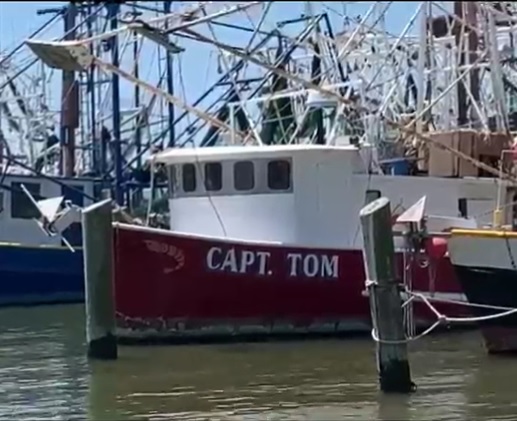
Shrimp season threatened by Coronavirus pandemic
With seafood processors across South Mississippi closed for business, the shrimping season slated to open in as few as four weeks could be sidelined by another disaster. Because many coronavirus restrictions are still in place on the Gulf Coast, processors, shrimpers and the restaurant industry could take a hit for the second year in a row. Freshly caught shrimp will soon be harvested from the Mississippi Sound, but with coronavirus restrictions still in place, seafood processors that have been closed already have plenty of stock on ice. video, >click to read< 12:21
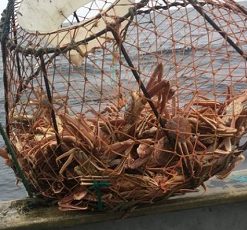
FFAW, processors remain at odds on opening Newfoundland and Labrador crab season
It remains to be seen whether harvesters in the province will eventually start fishing for crab and offloading it at plants for processing. According to the Fish, Food and Allied Workers (FFAW-Unifor), two vessels from outside the province were turned away in Port Aux Basques and denied the opportunity to offload crab as of Monday morning, and three transport trucks carrying crab harvested outside the province were being blocked from making deliveries to fish plants, two in South Brook and one at Goobies. “The fishery was postponed three times on health and safety issues,” Pretty said. “During that time, the bargaining for the price of crab should have progressed, but instead of progressing,,, >click to read< 19:46
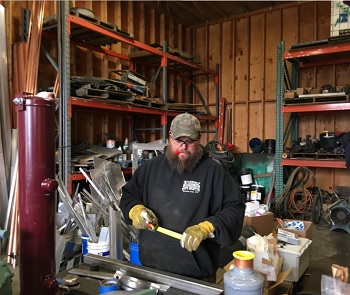
Coronavirus: Restaurant Closures Put Oregon Seafood Industry In Limbo
Commercial fisherman Clint Funderburg should be on the ocean right now, catching Dungeness crab on his fishing boat, the Widgeon. When crab prices tanked a few weeks ago, he shifted gears to his off-season side gig. So, he’s building a refrigeration system for one of the many fishing boats that are stuck at the dock right now. Mandatory restaurant closures during the coronavirus pandemic have sent shock waves through Oregon’s $700 million seafood industry. The overwhelming majority of the seafood that lands on Oregon’s docks gets eaten in restaurants, and no one knows when that market will return. In the meantime, fishermen are parking their boats as seafood prices plummet. >click to read< 18:04
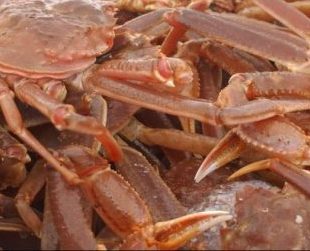
Feds delay Snow Crab season in Gulf of St. Lawrence
The Department of Fisheries and Oceans said the decision on Thursday to pause the season will let everyone involved in the fishery to put necessary health and safety measures in place. Seafood processors in the Maritimes had called on Ottawa to delay the crab and lobster season, warning that moving ahead with fishing risks workers’ health — and the bottom line — amid the COVID-19 pandemic.,, New Brunswick Premier Blaine Higgs said Thursday the province hopes Fisheries and Oceans Canada will delay the spring season for a few weeks, with the possibility of federal compensation. The Maritime Fishermen’s Union, which represents 1,200 harvesters in New Brunswick, said Friday they support a delay of the lobster season until May 15 >click to read< 16:28
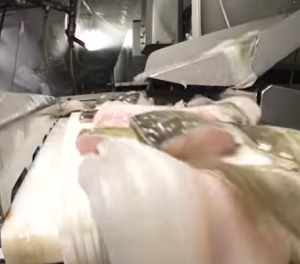
Coronavirus: Seafood processors respond to COVID-19 with added precautions
Seafood industry processors say they are in ongoing discussions with local, state and federal partners,,, The seafood industry talking points including working around the clock on prevention and response, coordinating with partners that include public health officials, preventing the spread of COVID-19 within Alaska and keeping seafood safe, said Stephanie Madsen, executive director of the At-Sea Processors Association. The Seattle-based trade association represents six member companies who own and operate 16 U.S. flagged catcher/processor vessels participating principally in the Alaska Pollock fishery and West Coast Pacific whiting fishery. The group includes American Seafoods Co., Arctic Storm Management Group LLC, Coastal Villages Region Fund, Glacier Fish Company LLC, Aleutian Spray Fisheries Inc. and Trident Seafoods. >click to read< 20:56
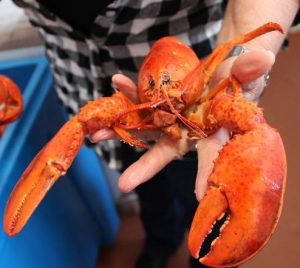
Seafood processors getting no negative vibes from China
Cape Breton seafood processors say they are not hearing about any potential negative impact on their industry as a diplomatic dispute between Canada and China continues to simmer. Earlier this week China suspended a second major Canadian canola exporter over alleged safety concerns, further deepening a diplomatic row set off by Canada’s decision to detain a top executive with telecom giant Huawei Technologies Ltd. at the behest of the United States. Osborne Burke, general manager of Victoria Co-operative Fisheries Ltd. in Neils Harbour, was at a seafood expo in Shanghai in February where there was no mention of the Huawei dispute. >click to read<12:15
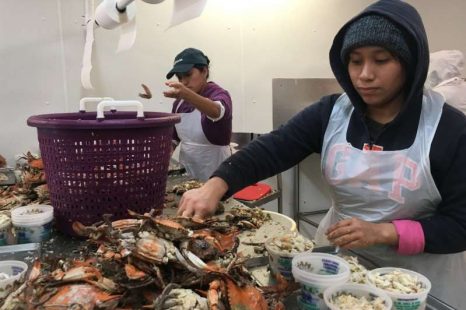
Maryland’s Crab Country: Not Enough Visas, Not Enough Workers
Music blared as 21 Mexican women methodically cracked open steamed crabs piled high inside a cool, bright room. They picked out the meat and packed it into 1-pound containers that their employer, G.W. Hall & Sons, ships to wholesalers in the mid-Atlantic and as far away as Canada. A half-mile down Old House Point Road, the picking room at a competing company, Russell Hall Seafood, was silent, no workers to be seen. Bare metal tables, normally heaped with crabs this time of year, gleamed. The difference: one firm won the visa lottery, and the other lost. “It trickles all the way down the line,” said fisherman Burl Lewis, who normally sells a large amount of menhaden to Russell Hall Seafood but recently laid off a crew member from his 52-foot boat, the Trying Times. “The Mexican labor creates jobs for Americans. It’s creating my job.” >click to read<16:49
Hiring seafood workers in Bristol Bay has been tough for years. This summer, it’s worse.
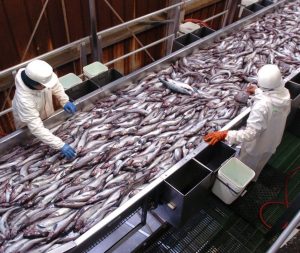 Seafood processors in Alaska’s Bristol Bay this summer have had trouble finding enough workers to handle the fish that come through their plants. Those in the industry say a confluence of factors, including a lack of visas for bringing foreign workers to the industry, a hotter economy in the Lower 48, and a record-breaking salmon run in Bristol Bay, was to blame. “There was a significant lack of process workers for some companies in the bay, and it exacerbated the problems of having to deal with high levels of harvest,” said John Garner, president of Seattle-based North Pacific Seafoods, which has locations across Alaska. Some processors couldn’t keep up with the huge amount of fish coming in, which forced them to resort to whatever method was fastest to get the pounds through the plant. click here to read the story 10:03
Seafood processors in Alaska’s Bristol Bay this summer have had trouble finding enough workers to handle the fish that come through their plants. Those in the industry say a confluence of factors, including a lack of visas for bringing foreign workers to the industry, a hotter economy in the Lower 48, and a record-breaking salmon run in Bristol Bay, was to blame. “There was a significant lack of process workers for some companies in the bay, and it exacerbated the problems of having to deal with high levels of harvest,” said John Garner, president of Seattle-based North Pacific Seafoods, which has locations across Alaska. Some processors couldn’t keep up with the huge amount of fish coming in, which forced them to resort to whatever method was fastest to get the pounds through the plant. click here to read the story 10:03
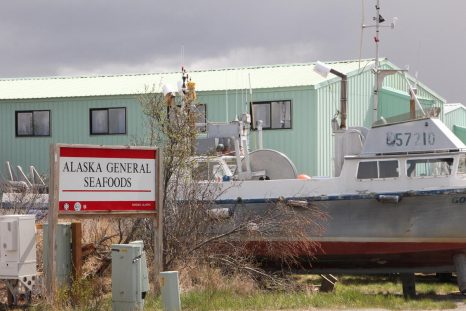
Alaska Seafood processors relying more heavily on U.S. workers this year
Seafood employers need to fill many seasonal jobs every salmon season. In general, that process remains the same year to year. Nelson San Juan is the seafood employment coordinator for the Alaska Department of Labor. He says employers are leaning on state labor resources more than usual this year. “A lot of them are depending highly with the seafood unit because of, well they used to use these H-2B visa, and some of them decided not to use it or for some reason they were not able to use that program this year.” The H-2B program allows U.S. employers to hire temporary workers from overseas. San Juan says employers who did decide to use the program ran into a problem. Audio click here to read the story 18:50
BP Drops drop its bid to avoid paying 1 Billion Seafood Industry Spill Payments
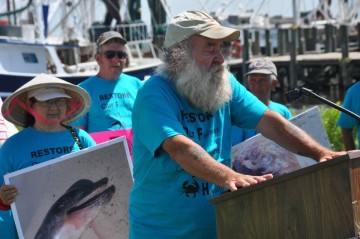 After fighting for more than two years to avoid paying almost $1 billion in oil spill damages to Gulf Coast shrimpers, oystermen and seafood processors it claimed didn’t exist, BP Plc has thrown in the towel. A federal judge in New Orleans Monday allowed BP to drop its bid to avoid paying the second half of $2.3 billion in compensation promised to seafood interests harmed by the blown-out well. The subsea gusher pumped more than 4 million barrels of crude into the Gulf of Mexico in 2010, closing fisheries and blackening the shores of five states. BP had paid out about $1 billion of the seafood fund when it balked at paying the remainder after discovering irregularities in one law firm’s client list. The seafood payout is a separate earmark within BP’s Read the rest here 07:23
After fighting for more than two years to avoid paying almost $1 billion in oil spill damages to Gulf Coast shrimpers, oystermen and seafood processors it claimed didn’t exist, BP Plc has thrown in the towel. A federal judge in New Orleans Monday allowed BP to drop its bid to avoid paying the second half of $2.3 billion in compensation promised to seafood interests harmed by the blown-out well. The subsea gusher pumped more than 4 million barrels of crude into the Gulf of Mexico in 2010, closing fisheries and blackening the shores of five states. BP had paid out about $1 billion of the seafood fund when it balked at paying the remainder after discovering irregularities in one law firm’s client list. The seafood payout is a separate earmark within BP’s Read the rest here 07:23
All hands on deck for Alaska plan to solve marine worker shortage
 With our massive land endowment and bragging rights as the largest state in the nation, it’s easy to lose sight of an important fact – Alaska is a maritime state.,, The waters off Alaska’s shores produce more than 60 percent of the nation’s seafood harvest. Read more here 09:32
With our massive land endowment and bragging rights as the largest state in the nation, it’s easy to lose sight of an important fact – Alaska is a maritime state.,, The waters off Alaska’s shores produce more than 60 percent of the nation’s seafood harvest. Read more here 09:32
Scientists unable to completely explain the mystery of the missing blue crabs
 A year and a half ago, there seemed to be no shortage of good news about blue crabs. The annual winter dredge survey estimated 764 million blue crabs were in the Bay, the most in 19 years and a huge jump from the previous year. The governors of Maryland and Virginia issued a joint news release talking about the “extraordinary explosion in juvenile blue crab abundance.” more@bayjournal.com 13:19
A year and a half ago, there seemed to be no shortage of good news about blue crabs. The annual winter dredge survey estimated 764 million blue crabs were in the Bay, the most in 19 years and a huge jump from the previous year. The governors of Maryland and Virginia issued a joint news release talking about the “extraordinary explosion in juvenile blue crab abundance.” more@bayjournal.com 13:19
Petersburg Alaska Seafood Company Makes Big Move – Audio
KFSK – Petersburg – One of Petersburg’s small seafood processors is about to get a lot bigger. Tonka Seafoods has bought a long-unused cannery building and dock from Trident Seafoods. continued
Seafood processors fined for releasing millions of lb of seafood waste into the Bering Sea, Gulf of Alaska and North Pacific Ocean
Three seafood processors agreed to settle federal Clean Water Act violations for their vessels’ seafood waste discharges off Alaska’s coast with the US Environmental Protection Agency (EPA) and pay fines. Aleutian Spray Fisheries, Inc, United States Seafoods, LLC and Ocean Peace Inc, and their vessels are responsible for releasing millions of lb of seafood waste into the Bering Sea, Gulf of Alaska and North Pacific Ocean every year. http://fis.com/fis/worldnews/worldnews.asp?l=e&ndb=1&id=57136






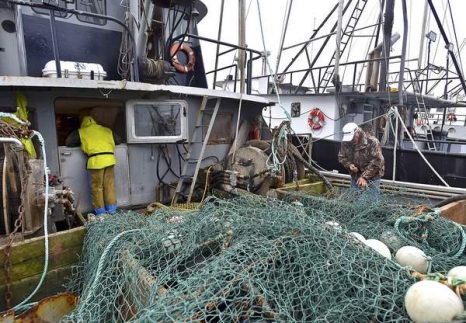


 “First of all, we don’t have the population pressures on our coast that Washington and California do,” he said. “So, we have room for commercial fisheries — fleets, processing centers — those are the kind of things that have been the backbone of the Oregon coast for many decades. But, that’s really true now, thanks to the increased demand for the quality seafood that we produce off our coast.”
“First of all, we don’t have the population pressures on our coast that Washington and California do,” he said. “So, we have room for commercial fisheries — fleets, processing centers — those are the kind of things that have been the backbone of the Oregon coast for many decades. But, that’s really true now, thanks to the increased demand for the quality seafood that we produce off our coast.” 


























